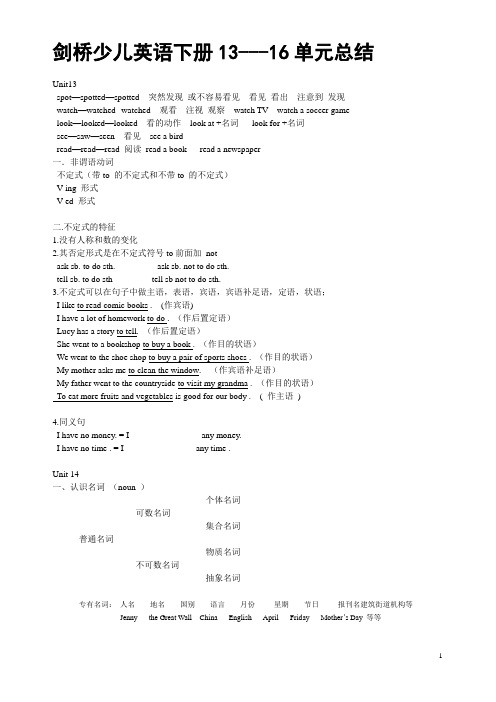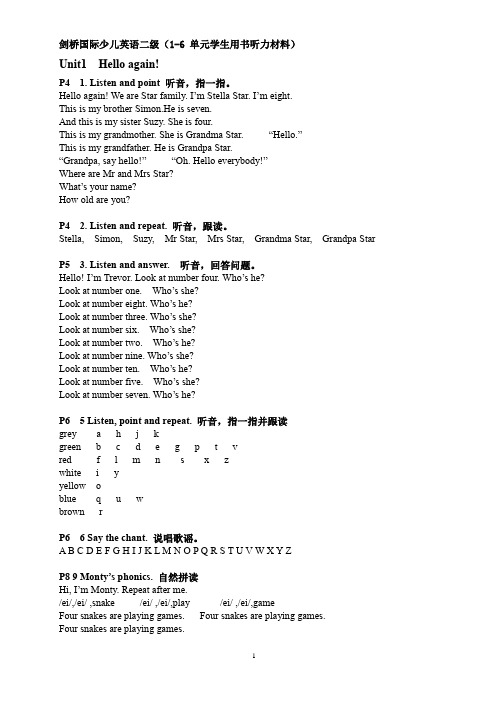经典剑桥少儿英语二级下Unit16.ppt
最新最全剑桥二级下册Unit16

最新最全剑桥二级下册Unit16二级下Unit 16 He can do better than his brother!教学目的和要求Teaching aims and demands 通过学习本单元,学生能进一步提高对英语的整体兴趣综合复习各种问句,学会与人简单交流的话语学生基本能用英语复述本单元的故事交际用语Expressions in communication He can do better than his brother.How often do you eat cake?Why is she talking to him?What’s the weather like today?What’s your favourite colour?What’s your favourite animal?How much water do you want?When does the class begin?What’s the name of your school?重点朗读词汇Key words and expressions better, round, score, darts, throw, outer, ring, double,triple, same, sadly, miss, fair, bright, early, feel, wheel,circle, fix, space, opposite所需教具Materials for teaching 一个投掷用的网兜或纸篓子若干个羽毛球三个用布做的小圆球或圆沙包(可以用小子代替)飞镖盘(根据情况而定)图形或实物太阳和月亮的图片或图形本单元第三部分所需要的用具和材料如何导入教学?上课时,教师对学生说:“Today we are going to play lots of games. Do you like to play games? First want to divide our class into two teams. Boys stand on this side, in a line, Girls stand on this side, in a line. We are going to throw the shuttlecock into the net/basket. Then we’ll see which team has more shots. Do you understand? Let’s get ready.” 教师在地上画一条线,距离大约在两米以外。
剑桥少儿英语二级下册(ppt)

I can walk with my legs.
I can see the tiger with my eyes.
I can taste the cheese with my tongue.
I can eat the food with my mouth.
8. Pairwork.
nose hand ears legs e.g. I can walk with my legs. I can smell with my nose
A panda can eat bamboo shoots with mouth .
The monkey can bounce a ball with hands .
The horse can run with legs .
Let’s help the animals to give us a self-introduction(自我介绍) : I’m … ( big/ small / white / cute ) I like … (meat / carrots / bones ) I can … (run / jump / eat bananas )
I can hear a dog coming. I can hear a cat crying. I can hear the telephone ringing. I can hear the sound of a fire. I can hear the sound of a TV programme.
mouth
I can sing with my mouth . We can sing with our mouths .
brush I can clean the elephant with a brush
剑桥少儿英语二级下册Unit讲课文档

我必须洗洗衣服。
She has to look after her little sister.
她不得不照顾她的小妹妹。
I had to do my homework last night.
昨晚我不得不做作业。
第十二页
Translation
1、 我得整理房间。
I have to tidy my room.
2、明天我得去拜访王先生。 I have to visit Mr Wang tomorrow. 3、我得在家照看我妈妈。 I have to look after my mom at home. 4、 昨天他不得不待在家里。 He had to stay at home yesterday. 5、我们必须认真听老师讲课。 We have to listen to the teachers carefully.
第十三页
第十四页
c
f
e
d
b
a
第十五页
第十六页
Story
1.Who is Simon? 2.Where does he live?
3.Is Simon clever?
4.What did he do to a cat?
第十七页
第十八页
第十九页
1. 2.
3.
4. 5. 6.
7.
第二十页
1 2
第七页
Q:
1.How many mice in the story? 2.Who didn’t like to go to the city?
3. Why didn’t they like to go to the city?
剑桥少儿英语二级下册Unit课件

在形容词词尾直接加-ly。
ቤተ መጻሕፍቲ ባይዱ
Make sentences
Turn to page87
2)The boy makes a loud noise. The boy shouts loudly. 3)The room is quiet. The boy walks into the room quietly. 4)The car is quick. The driver drives the car quickly. 5)The happy bird is in the tree. The bird sings happily. 6)The boy is careful with his handwriting. The boy writes his homework carefully. 7)The girl is beautiful. The girl dances beautifully. 8)The pictures are different. The boys draw the pictures differently.
形容词变副词的规则:
如:busy-busily; angry-angrily; easy-easily
二、以辅音字母加y结尾的形容词要变y为i,然后再加ly
和以-ue结尾的形容词要先去掉e,然后再加-y或-ly。 如: terrible-terribly; true-truly; gentle-gently
添加标题
The parrot is in the yard in the middle of the picture.
添加标题
The pigs are in front of the shopping window on the top of the picture.
剑桥少儿英语二级PPT学习教案

Unit 2 Is this book yours? 这本书是你的吗?
第11页/共78页
Unit 3 Our school is beautiful. 我们的学校很漂亮。
第12页/共78页
Unit 3 Our school is beautiful. 我们的学校很漂亮。
第13页/共78页
第25页/共78页
Unit 4 Miss , can I ask you a question? 小姐,我可以问你的问题吗?
第26页/共78页
Unit 4 Miss , can I ask you a question? 小姐,我可以问你的问题吗?
第27页/共78页
Unit 4 Miss , can I ask you a question? 小姐,我可以问你的问题吗?
第3页/共78页
Unit 1 I've got many new friends. 我有许多新朋友。
第4页/共78页
Unit 1 I've got many new friends. 我有许多新朋友。
第5页/共78页
Unit 1 I've got many new friends. 我有许多新朋友。
第63页/共78页
Unit 13 My seven days 我的一周
第64页/共78页
Unit 13 My seven days 我的一周
第65页/共78页
Unit 13 My seven days 我的一周
第66页/共78页
Unit 13 My seven days 我的一周
第67页/共78页
剑桥少儿英语二级
会计学
1
二级下13--16单元

剑桥少儿英语下册13---16单元总结Unit13spot—spotted—spotted 突然发现或不容易看见看见看出注意到发现watch—watched--watched 观看注视观察watch TV watch a soccer game look—looked—looked 看的动作look at +名词look for +名词see—saw—seen 看见see a birdread—read—read 阅读read a book read a newspaper一.非谓语动词不定式(带to 的不定式和不带to 的不定式)V-ing 形式V-ed 形式二.不定式的特征1.没有人称和数的变化2.其否定形式是在不定式符号to前面加notask sb. to do sth. ------------- ask sb. not to do sth.tell sb. to do sth ------------ tell sb not to do sth.3.不定式可以在句子中做主语,表语,宾语,宾语补足语,定语,状语;I like to read comic books . (作宾语)I have a lot of homework to do . (作后置定语)Lucy has a story to tell. (作后置定语)She went to a bookshop to buy a book . (作目的状语)We went to the shoe shop to buy a pair of sports shoes . (作目的状语)My mother asks me to clean the window. (作宾语补足语)My father went to the countryside to visit my grandma . (作目的状语)To eat more fruits and vegetables is good for our body . ( 作主语)4.同义句I have no money. = I ______ ________any money.I have no time . = I _______ ________ any time .Unit 14一、认识名词(noun )个体名词可数名词集合名词普通名词物质名词不可数名词抽象名词专有名词:人名地名国别语言月份星期节日报刊名建筑街道机构等Jenny the Great Wall China English April Friday Mother’s Day 等等温馨提示:1、抽象名词:指人或事物的品质,情感状态等抽象概念的。
剑桥少儿英语2B教案+试题-剑桥少儿英语二级下册2B教案_Unit_16

Unit 16He can do better than his brother!Teaching aims and memands:★To learn and master the adverb parative level of expression.The main and difficult points:★S entence structure :※He can do better than his brother.※I can sing songs more beautifully than others.★New words :round, dart, score, outer, double, inner, triple, bull, sad, fair, sleepy,shine, bright, clip, fix.Teaching materials:新知堂课件,自制课件Teaching process;Activity1 : warm up:Listen to the chant of part 4, then try to say the chant together.Activity2 :New lesson※Part4:I can sing songs more beautifully than others. Ican read more quickly than my friends.1.Ask and answer questions, Eg: who can sing songs more beautifully?(I can sing songs more beautifully)Find out two students,sing songs and say:I cansing songs more beautifully than you.Say other sentences like this.(看课件让孩子做更多的句子 )※part 7 :Say the sentences in pairs,(---can draw/swim/run better than---)※Part 2 ( 看自制课件 )1. Listen to the short passage and answer some questions on the board.(自制课件)2.Listen to the tape by sentence and repeat.3.看新知堂课件, strengthen the passage.4.Practice by themselves.Activity 3 : Summary:Teacher gives some key adverbs, let students say sentences.Activity 4 :Homework:1.Write some sentences about adverb.2. Do the workbook of unit 16.本单元课件与新知堂课件并用,分为两部分。
剑桥国际少儿英语二级(1-6 单元学生用书听力材料)

剑桥国际少儿英语二级(1-6 单元学生用书听力材料)Unit1 Hello again!P4 1. Listen and point 听音,指一指。
Hello again! We are Star family. I‟m Stella Star. I‟m eight.This is my brother Simon.He is seven.And this is my sister Suzy. She is four.This is my grandmother. She is Grandma Star. “Hello.”This is my grandfather. He is Grandpa Star.“Grandpa, say hello!”“Oh. Hello everybody!”Where are Mr and Mrs Star?What‟s your name?How old are you?P4 2. Listen and repeat. 听音,跟读。
Stella, Simon, Suzy, Mr Star, Mrs Star, Grandma Star, Grandpa Star P5 3. Listen and answer. 听音,回答问题。
Hello! I‟m Trevor. Look at number four. Who‟s he?Look at number one. Who‟s she?Look at number eight. Who‟s he?Look at number three. Who‟s she?Look at number six. Who‟s she?Look at number two. Who‟s he?Look at number nine. Who‟s she?Look at number ten. Who‟s he?Look at number five. Who‟s she?Look at number seven. Who‟s he?P6 5 Listen, point and repeat. 听音,指一指并跟读grey a h j kgreen b c d e g p t vred f l m n s x zwhite i yyellow oblue q u wbrown rP6 6 Say the chant. 说唱歌谣。
- 1、下载文档前请自行甄别文档内容的完整性,平台不提供额外的编辑、内容补充、找答案等附加服务。
- 2、"仅部分预览"的文档,不可在线预览部分如存在完整性等问题,可反馈申请退款(可完整预览的文档不适用该条件!)。
- 3、如文档侵犯您的权益,请联系客服反馈,我们会尽快为您处理(人工客服工作时间:9:00-18:30)。
Grammar
.,
1
❖ 1.形容词比较级的定义:
❖ 两个同类事物之间(人或物)之间进行比较。
❖ 2.形容词比较级的变化规则:
❖ ⑴规则变化:直接在词尾+er.
❖ ⑵词尾只有一个辅音,这个辅音前只有一个元音, 要双写该辅音字母再+er
❖ ⑶以辅音字母+y的需把y变i再+er。
❖ happy---happier
❖ *7.good---better *8. well---better
❖ 9. quickly---- more quic., kly
3
❖ 1.“形容词” 转变 “副词”:
❖ 1).通常情况下在 “形容词”的末尾+ly, 变成所对应 的副词:
❖ slow—slowly loud—loudly quiet—quietly
❖ B.副词: 译为 “….地”
❖ 1. 用来修饰动词, 表示动作怎么样
❖ Eg:
The train went slowly. 火车慢慢地行驶.
❖
动词+slowly (表示行驶的速度)
❖
转换为 “形容词”: The train is slow.
.,
5
❖ 1.情态动词Can的疑问句:
❖ 直接用Can来提问:
❖ 特殊疑问词:
❖ 2.以H开头的特殊疑问词:
❖
1).How high (多高): How high can a
kangaroo hop?.,
6
❖ 3).how many: 多少(对可数名词提问)
❖ Eg: How many children in the classroom?
❖ 4).how much: ①.多少钱 ②.多少(对不可数名词 提问)
.,
9
❖ bad—badly quick—quickly
❖ 2).以e结尾的形容词, 去e+ly变成所对应的副词:
❖ terrible—terribly (糟糕地)
❖ true—truly (真实地)
❖ 3).以y结尾的形容词, 把y变i+ly变成所对应的副词:
❖ noisy—noisily
angry—angrily
❖ Eg: She is a nice teacher. 她是一个温柔的老师.
❖
nice+名词 (表示…..样的老师)
❖ 2). 用在Be的后面----Be+形容词
❖ Eg: My mother is very beautiful. 我的妈妈很漂亮.
❖ Be + 形容词 (表示妈妈是.....的样子)
❖ busy—busily
happy—-happily
❖ 4).以l结尾的形容词, 直接+ly变成所对应的副词:
❖
careful—carefully
❖
beautiful—be.a, utifully
4
❖ 2.“形容词” 和 “副词” 的使用:
❖ A.形容词: 译为 “….的”
❖ 1). 用来修饰名词
❖ Eg: Which one do you like? ❖ 5).who: 谁, 对主语提问
❖ Eg: Who is your foreign teacher?
❖
.,
8
❖ 6).whose: 谁的 ❖ Eg: Whose pen is this? ❖ 8).why:为什么,与because连用 ❖ Eg: Why do you like English?
❖ Eg: Can you go shopping with me?
❖ Yes, I can. / No, I can’t.
❖ 2. 含有can的陈述句+can+主语?
❖ I can spot the frog, can you?
❖ 我能认出青蛙, 你能吗?
❖ Yes, I can. / Sorry, I can’t.
❖ Eg: How much is the new computer?
❖ How much water in the glass?
❖ 5).how often: 多久一次
❖ Eg: How often do you go to the zoo?
❖ 6).how old: (多大) How old is your father?
❖ beautifully----more beautifully
❖ Doing exercises ❖ 写出下列单词的比较级
❖ 1.thin---thinner 2. small---smaller
❖ 3.easy---easier 4. fat---fatter
❖ 5.happy--- happier 6. big---bigger
❖ 3.以W开头的特殊疑问词: ❖ 1).what: (什么) What are you doing? ❖ 2).when:什么时候=what time
❖ Eg: When is your birthday?
❖ What time is it? ❖ 3).where: 哪里,对地点提问
❖ Eg: Where is my new book? ❖ 4).which: 哪一个
❖ (4)多音节词变比较级在词前+more
❖ beautiful-----more beautiful
❖ 3.形容词的比较级用than来连接“比…更”
❖ eg:I‘m taller than Coc.o, .
2
❖ 4.副词比较级:直接在副词前+more(简单 了解)
❖ eg: careБайду номын сангаасully----more carefully
❖ 7).how: (怎样) How do you go to school?
❖ 8).how about: 关于(接doing形式)
❖ Eg: How about fishing with us?
❖
9).how far: 多远
.,
7
❖
Eg: How far is it from Daqing to Harbin?
